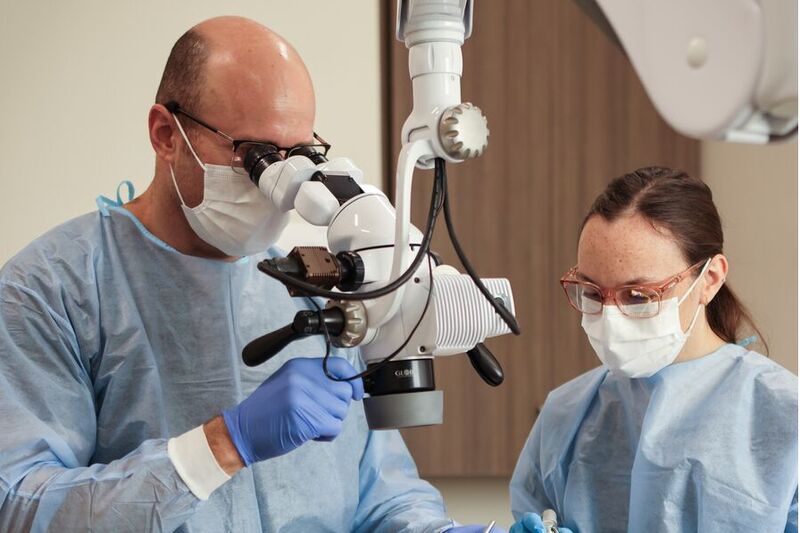Apicoectomy - Endodontic Surgery
Endodontic surgery is usually the final attempt to save a natural tooth and is most often performed when some infection persists even after root canal treatment. When possible, our endodontists always recommend trying to keep natural teeth because they tend to function with fewer problems than any type of replacement. Oral health and a beautiful smile start at the roots!
What is an Apicoectomy?
In most cases, a root canal or root canal retreatment can save your tooth in cases of severe decay, cracks, or traumatic injuries. However, there are times when an abscess or other problem persists after root canal treatment. In these cases, an apicoectomy, also called endodontic surgery, is an option.
An apicoectomy allows the Endodontist to access the root of the tooth without going through the top portion of the tooth found above the gum line, which is done during a root canal or endodontic retreatment.
An apicoectomy is a micro-surgical procedure, during which a small incision is made in the gingival (gum) tissue. This incision exposes the inflamed/infected tissue and the bone, the infected tissue is then removed along with the tip (apex) of the root. The inflamed tissue and tip of the root are both removed. The exposed roots are then cleaned, followed by a biocompatible filling placed at the end of the remaining root to prevent reinfection. The concluding step of the procedure is to suture the gum tissue. With the source of infection now gone, the bone will naturally heal in the area surrounding the tip of the root.
Why do I need an Apicoectomy?
Endodontic surgery is recommended by our Melbourne, Florida Endodontists only after a root canal or root canal retreatment fails. By far the most common cause of a root canal related problem continuing after treatment is persistent infection. If the canal is not filled completely, or if the anatomy inside of the root is extremely complex, bacteria can sometimes survive within the canal, even if the root canal filling looks good on an X-ray.
In addition, there are times when bacteria are able to survive outside of the tooth and within your bone. In a case like that, no matter how clean the canals are, the bacteria and all of their toxic products will persist until they are surgically removed. In addition, if there are cracks or areas of the tooth that cannot be cleaned for some reason, the infection may not be possible to eliminate without removing the cracked portion of the tooth.
In rare cases, even if there is no infection, a cyst may not resolve after root canal treatment. This can be because it has material in it that is difficult for your body to clean up, and it can sometimes happen because some cysts produce chemicals on their own that prevent them from being cleared. In those cases, the only way to clear the problem is to surgically remove the source of the problem, which is usually something right at the end of the root.
Apicoectomy
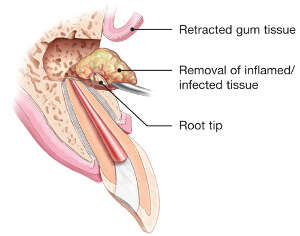
Endodontic Surgery Explained
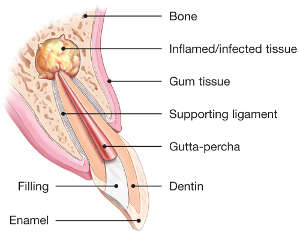
Root End Filling
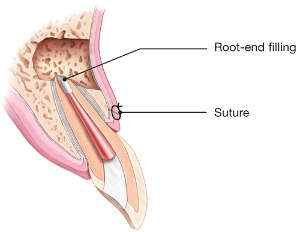
Endodontic Surgery Healed
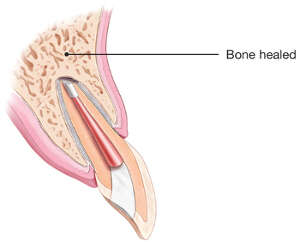
Post Operative Care - Apicoectomy (Endodontic Surgery)
- DO NOT LIFT YOUR LIP: This could tear your sutures and cause delayed healing.
- BLEEDING: A small amount of bleeding for several hours after surgery is normal. Even a very minute amount of blood will turn an entire mouth full of saliva red. If excessive or continuous bleeding occurs, please call. Lay a towel on a pillow while resting.
- PAIN: If pain medications have been prescribed, they are best taken before the numbness wears off. Because you have had surgery, some post-operative discomfort may be present, even with your prescription. Do not take on an empty stomach.
- ANTIBIOTICS: If you have been given a prescription for antibiotics, take ALL the tablets as prescribed. Start today.
- SWELLING/BRUISING: Following endodontic surgery, some swelling and minor bruising are normal and may continue for several days. However, if fever develops, please call immediately. To help control swelling, an ice pack should be placed on the cheek for 15 minutes on; 10 minutes off; then repeat until bedtime.
- EATING: Do not drink any alcohol while taking pain medications. It is important that you continue to receive proper nourishment. Unless otherwise instructed, it is usually more comfortable to limit the diet to cold, soft food during the first 12-24 hours. It is very important to maintain your normal fluid intake. Do not miss meals or allow yourself to become dehydrated.
- ORAL HYGIENE: On the day of surgery, brush and floss in the areas except for the surgical site. Warm salt water rinses 4 times a day (1/2 teaspoon salt to a glass of warm water) This will make your mouth taste better and accelerate healing, do not initiate rinsing until 24 hours after surgery.
- SUTURES: Sutures will need to be removed at your post-operative check appointment.
If you have any problems or questions before or after surgery, please call our office located in Suntree, Florida. Our focus on compassionate and comfortable care sets us apart from the rest. We thank our many patients for entrusting us with your oral healthcare needs. If you are in severe pain or have another type of endodontic emergency, contact us today. We will make every effort to get you seen immediately.

